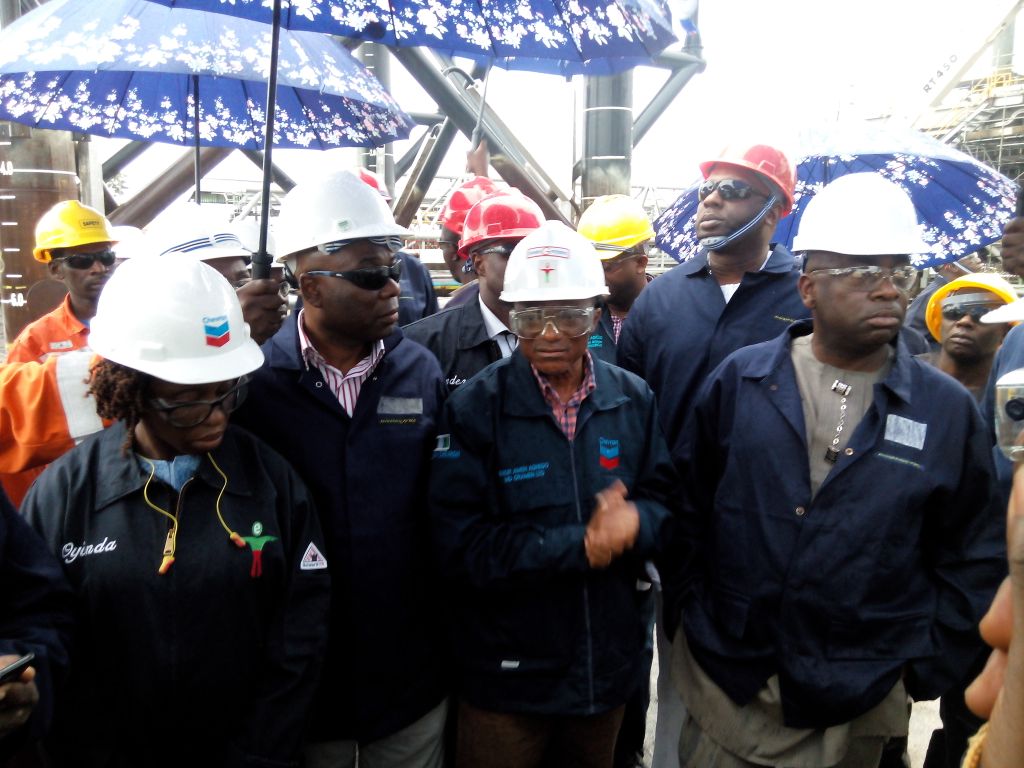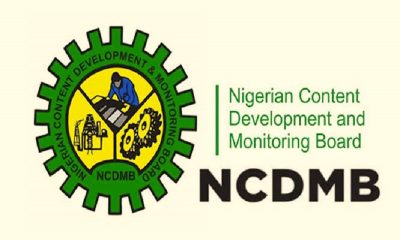Economy
NCDMB Boss Tasks Local Firms to be Competitive

By Dipo Olowookere
Executive Secretary of the Nigerian Content Development and Monitoring Board (NCDMB), Mr Simbi Wabote, has advised local service companies and manufacturers to strive to be competitive and adjust their business models in line with trends to stay in business.
Mr Wabote gave this charge while speaking on the Requirements for Sustainable Growth of Manufacturing in Nigeria’s Oil & Gas Sector, at the Nigerian International Pipeline Technology and Security Conference organized by the Pipeline Professionals Association of Nigeria in Abuja recently.
According to him, the board will continue to ensure patronage of local businesses in line with the provisions of the Nigerian Content Act and Presidential Executive Order 003, but companies that set their prices above reasonable thresholds will not be supported.
“It must be stated that local content is not at all cost. There is a level of premium that becomes un-economic for patronage and there is little the Board can do in such situations,” he said.
He commended the Federal Government for promoting the Local Content policy through various initiatives, one of which is the Executive Order 003, which mandates all Ministries, Departments and Agencies to give consideration for the procurement of at least 40 percent made-in-Nigeria products and services across all sectors of the economy.
Speaking further, the Executive Secretary listed requirements that would make the nation’s manufacturing sector grow, including the provision of steady power supply and patronage of locally manufactured goods.
He also gave an insight into some achievements recorded by the Board, including an increase of in-country value addition from the paltry five percent level to 26 percent.
Mr Wabote mentioned the existence of two world-class pipe mills, five pipe coating yards, the increase in the number of Nigerian-owed marine vessels to 36 percent, resuscitation of moribund dry-dock facilities and local manufacturing of electrical cables required in the oil and gas industry. He further stated that Nigeria has also grown its fabrication capability to over 60,000 metric tonnes per annum and has capacity to carry out over 80 percent of engineering design in-country.
Other achievements of the Board include the creation of over 30,000 direct jobs, delivery of over six million training man-hours, award of over 90 percent of industry contracts to Nigerian companies, growth of indigenous operating companies and construction of facility for in-country integration of Floating, Production, Storage and Offloading vessels.
In his speech at the event, the Group Managing Director of the Nigerian National Petroleum Corporation (NNPC), Dr Maikanti Kacalla Baru, described pipeline vandalism as a great threat to Nigerian economy, both in terms of revenue lost and environmental effects and charged key players in the industry to confront the challenge.
He insisted that pipelines remained the cheapest means of transporting crude oil and natural gas, regretting that the Trans Niger Pipeline (TNP) with a capacity of 150,000 barrels of production per day (Bopd) was breached 39 times in 2016. “Year-to-date 2017, we have recorded 27 breaching incidents on the TNP,” he said.
The GMD added that “for the Trans Forcados Pipeline (TFP) with a capacity of 300,000 Bopd, recorded 17 breaches in 2016 while year-to-date 2017, we have recorded at least 15 breaching incidents on the TFP.”
Mr Baru also lamented that about 700,000 barrels of oil per day was deferred due to pipeline vandalism in 2016 “while power generation in the country dropped significantly as the gas plants had to shut down thereby resulting in shortages in gas supply to power.
“At present, huge amount of money is spent on protecting these pipelines which significantly add to the cost of production,” he added.
Economy
Tinubu Okays Extension of Ban on Raw Shea Nut Export by One Year

By Aduragbemi Omiyale
The ban on the export of raw shea nuts from Nigeria has been extended by one year by President Bola Tinubu.
A statement from the Special Adviser to the President on Information and Strategy, Mr Bayo Onanuga, on Wednesday disclosed that the ban is now till February 25, 2027.
It was emphasised that this decision underscores the administration’s commitment to advancing industrial development, strengthening domestic value addition, and supporting the objectives of the Renewed Hope Agenda.
The ban aims to deepen processing capacity within Nigeria, enhance livelihoods in shea-producing communities, and promote the growth of Nigerian exports anchored on value-added products, the statement noted.
To further these objectives, President Tinubu has authorised the two Ministers of the Federal Ministry of Industry, Trade and Investment, and the Presidential Food Security Coordination Unit (PFSCU), to coordinate the implementation of a unified, evidence-based national framework that aligns industrialisation, trade, and investment priorities across the shea nut value chain.
He also approved the adoption of an export framework established by the Nigerian Commodity Exchange (NCX) and the withdrawal of all waivers allowing the direct export of raw shea nuts.
The President directed that any excess supply of raw shea nuts should be exported exclusively through the NCX framework, in accordance with the approved guidelines.
Additionally, he directed the Federal Ministry of Finance to provide access to a dedicated NESS Support Window to enable the Federal Ministry of Industry, Trade and Investment to pilot a Livelihood Finance Mechanism to strengthen production and processing capacity.
Shea nuts, the oil-rich fruits from the shea tree common in the Savanna belt of Nigeria, are the raw material for shea butter, renowned for its moisturising, anti-inflammatory, and antioxidant properties. The extracted butter is a principal ingredient in cosmetics for skin and hair, as well as in edible cooking oil. The Federal Government encourages processing shea nuts into butter locally, as butter fetches between 10 and 20 times the price of the raw nuts.
The federal government said it remains committed to policies that promote inclusive growth, local manufacturing and position Nigeria as a competitive participant in global agricultural value chains.
Economy
NASD Bourse Rebounds as Unlisted Security Index Rises 1.27%

By Adedapo Adesanya
The NASD Over-the-Counter (OTC) Securities Exchange expanded for the first session this week by 1.27 per cent on Wednesday, February 25.
This lifted the NASD Unlisted Security Index (NSI) above 4,000 points, with a 50.45-point addition to close at 4,025.25 points compared with the previous day’s 3,974.80 points, as the market capitalisation added N30.19 billion to close at N2.408 trillion versus Tuesday’s N2.378 trillion.
At the trading session, FrieslandCampina Wamco Nigeria Plc grew by N5.00 to trade at N100.00 per share compared with the previous day’s N95.00 per share, Central Securities Clearing System (CSCS) Plc improved by N4.18 to sell at N70.00 per unit versus N65.82 per unit, and First Trust Mortgage Bank Plc increased by 14 Kobo to trade at N1.59 per share compared with the previous day’s N1.45 per share.
However, the share price of Geo-Fluids Plc depreciated by 27 Kobo at midweek to close at N3.27 per unit, in contrast to the N3.30 per unit it was transacted a day earlier.
At the midweek session, the volume of securities went down by 25.3 per cent to 8.7 million units from 11.6 million units, the value of securities decreased by 92.5 per cent to N80.7 million from N1.2 billion, and the number of deals slipped by 33.3 per cent to 32 deals from the preceding session’s 48 deals.
At the close of business, CSCS Plc remained the most traded stock by value on a year-to-date basis with 34.1 million units exchanged for N2.0 billion, trailed by Okitipupa Plc with 6.3 million units traded for N1.1 billion, and Geo-Fluids Plc with 122.0 million units valued at N478.0 million.
Resourcery Plc ended the trading session as the most traded stock by volume on a year-to-date basis with 1.05 billion units valued at N408.7 million, followed by Geo-Fluids Plc with 122.0 million units sold for N478.0 million, and CSCS Plc with 34.1 million units worth N2.0 billion.
Economy
Investors Lose N73bn as Bears Tighten Grip on Stock Exchange

By Dipo Olowookere
The bears consolidated their dominance on the Nigerian Exchange (NGX) Limited on Wednesday, inflicting an additional 0.09 per cent cut on the market.
At midweek, the market capitalisation of the domestic stock exchange went down by N73 billion to N124.754 trillion from the preceding day’s N124.827 trillion, and the All-Share Index (ASI) slipped by 114.32 points to 194,370.20 points from 194,484.52 points.
A look at the sectoral performance showed that only the consumer goods index closed in green, gaining 1.19 per cent due to buying pressure.
However, sustained profit-taking weakened the insurance space by 3.79 per cent, the banking index slumped by 2.07 per cent, the energy counter went down by 0.24 per cent, and the industrial goods sector shrank by 0.22 per cent.
Business Post reports that 25 equities ended on the gainers’ chart, and 54 equities finished on the losers’ table, representing a negative market breadth index and weak investor sentiment.
RT Briscoe lost 10.00 per cent to sell for N10.35, ABC Transport crashed by 10.00 per cent to N6.75, SAHCO depreciated by 9.98 per cent to N139.35, Haldane McCall gave up 9.93 per cent to trade at N3.99, and Vitafoam Nigeria decreased by 9.93 per cent to N112.50.
Conversely, Jaiz Bank gained 9.95 per cent to settle at N14.03, Okomu Oil appreciated by 9.93 per cent to N1,765.00, Trans-nationwide Express chalked up 9.77 per cent to close at N2.36, Fortis Global Insurance moved up by 9.72 per cent to 79 Kobo, and Champion Breweries rose by 5.39 per cent to N17.60.
Yesterday, 1.4 billion shares worth N46.2 billion were transacted in 70,222 deals compared with the 1.1 billion shares valued at N53.4 billion traded in 72,218 deals a day earlier, implying a rise in the trading volume by 27.27 per cent, and a decline in the trading value and number of deals by 13.48 per cent and 2.76 per cent, respectively.
Fortis Global Insurance ended the session as the busiest stock after trading 193.7 million units for N152.7 million, Zenith Bank transacted 120.7 million units worth N11.1 billion, Japaul exchanged 114.8 million units valued at N407.0 million, Ellah Lakes sold 98.4 million units worth N999.2 million, and Access Holdings traded 63.1 million units valued at N1.7 billion.
-

 Feature/OPED6 years ago
Feature/OPED6 years agoDavos was Different this year
-
Travel/Tourism10 years ago
Lagos Seals Western Lodge Hotel In Ikorodu
-

 Showbiz3 years ago
Showbiz3 years agoEstranged Lover Releases Videos of Empress Njamah Bathing
-

 Banking8 years ago
Banking8 years agoSort Codes of GTBank Branches in Nigeria
-

 Economy3 years ago
Economy3 years agoSubsidy Removal: CNG at N130 Per Litre Cheaper Than Petrol—IPMAN
-

 Banking3 years ago
Banking3 years agoSort Codes of UBA Branches in Nigeria
-

 Banking3 years ago
Banking3 years agoFirst Bank Announces Planned Downtime
-

 Sports3 years ago
Sports3 years agoHighest Paid Nigerian Footballer – How Much Do Nigerian Footballers Earn


















1 Comment